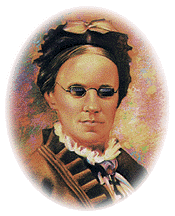Jesus, keep me near the cross;
There a precious fountain,
Free to all, a healing stream,
Flows from Calvary’s mountain.
In the cross, in the cross,
Be my glory ever,
Till my raptured soul shall find
Rest beyond the river.
Near the cross, a trembling soul,
Love and mercy found me;
There the bright and Morning Star
Shed its beams around me.
Near the cross! O Lamb of God,
Bring its scenes before me;
Help me walk from day to day
With its shadow o’er me.
Near the cross I’ll watch and wait,
Hoping, trusting ever,
Till I reach the golden strand
Just beyond the river.
 Composer William Doane wrote the melody of this very familiar, very beloved hymn before Fanny Crosby penned the words. She said the tune made her think of the opening line. She also wrote several other songs with the theme of the cross, after claiming Christ as her own Saviour in a church meeting in 1850, when she was thirty years old. The congregation had been singing Isaac Watts’ hymn: At the cross, at the cross, where I first saw the light.
Composer William Doane wrote the melody of this very familiar, very beloved hymn before Fanny Crosby penned the words. She said the tune made her think of the opening line. She also wrote several other songs with the theme of the cross, after claiming Christ as her own Saviour in a church meeting in 1850, when she was thirty years old. The congregation had been singing Isaac Watts’ hymn: At the cross, at the cross, where I first saw the light.
Previously, Fanny Crosby had written many poems while attending a school for the blind in New York City. She sometimes recited these for visiting dignitaries. Her blindness from infancy was a sad result of malpractice by a doctor. Would Miss Crosby have written so many hymns that touch our hearts, had it not been for her loss of sight? Certainly, we know God works good out of tragic circumstances. Fanny Crosby wrote over 8000 hymns in her lifetime!
Fanny Crosby had written many poems while attending a school for the blind in New York City Share on XAs we approach Easter, may we truly stay “near the cross” as we contemplate its significance to the world – in history, in the present, and in the future.
Fanny Crosby wrote over 8000 hymns in her lifetime! Share on XWORDS: FANNY CROSBY MUSIC: WILLIAM DOANE
S.A. SONG BOOK, 2015 EDITION, #178; 1987 EDITION, #115
REFERENCE: MORGAN, ROBERT J., THEN SINGS MY SOUL, BOOK 2
Traditional

Mens Vocal Arranagement






